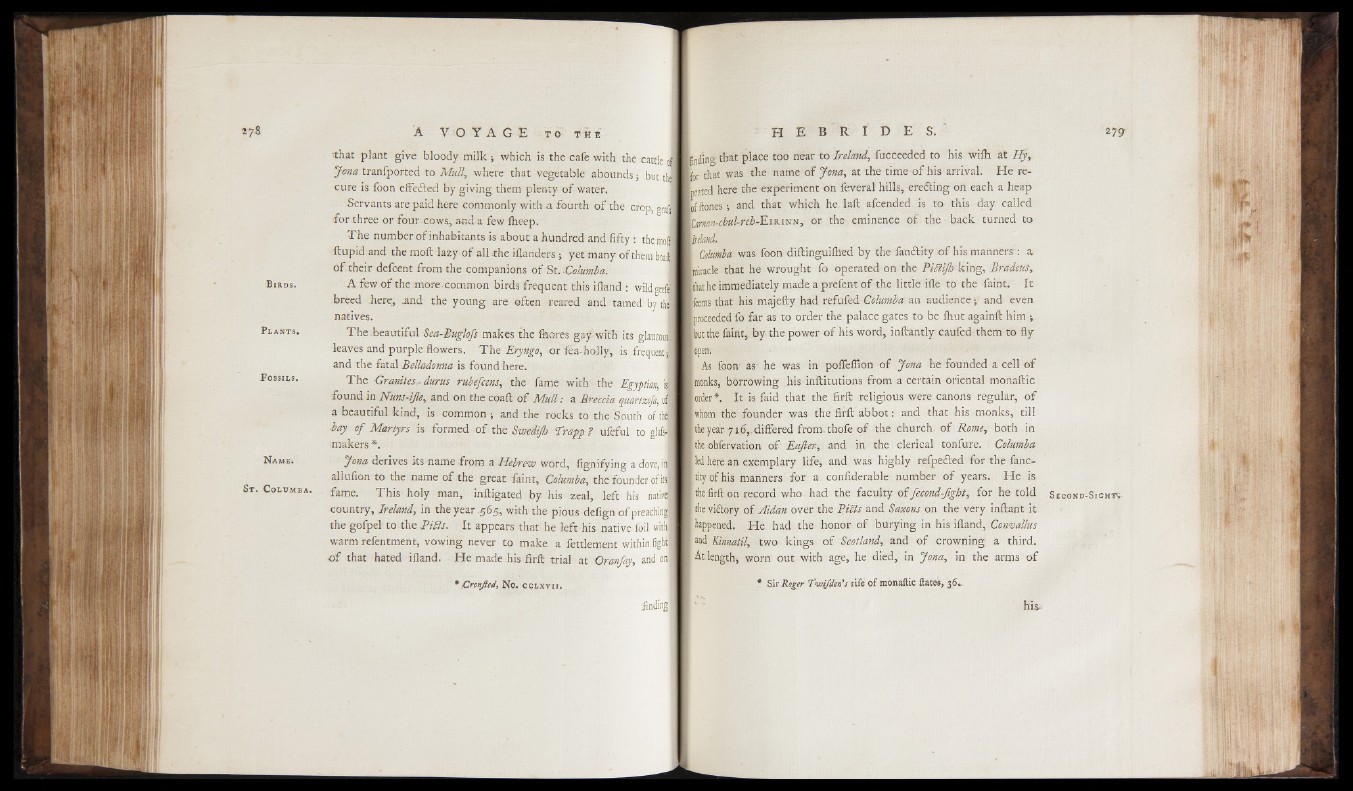
B i r d s .
P l a n t s .
.Fo s s i l s .
N a m e .
S t . C o l u m b a .
■that plant give bloody milk ; which is the cafe with the cattle o|
Jona tranfported to Mutt., where that vegetable abounds; but t !
cure is foon effected by giving them plenty of water.
Servants are paid here commonly with & fourth of the crop, g r j
for three or four cows, and a few Iheep.
The number of inhabitants is about a hundred and fifty: themoj
ft Lipid and the mofi: lazy of all the iilanders ; yet many of them boat*
of their defcent from the companions of St. Columba.
A few of the more-common birds frequent this ifland : wild gee!
breed .here, .and the young are often reared and tamed by thel
natives.
The .beautiful Sea-Buglofs makes the fhores gay with its glaucous
leaves and purple flowers. The Eryngo, or fea-holly, is frequent!
and the fatal Belladonna is found here.
The Granites., durus rubefcens, the fame with the Egyptian, is
found in Nuns-ijle, and on the coaft: of M ull: a Breccia quartzo/a, of j
a beautiful kind, is common ; and the rocks to the South of th!
■lay of Martyrs is formed of the Swedifh Trapp ? ufeful to glafs!
makers *.
Jona derives its name from a Hebrew word, fignifying a dove, in
allufion to the name of the great faint, Columba, the founder of it!
fame. This holy man, inftigated by his zeal, left his native!
country, Ireland, in the year 565, with the pious defign of preachin!
the gofpel to the P tlls. It appears that he left his native foil wit!
warm refentment, vowing never to make a fettlement within fightfl
o f that hated ifland. - He made his firfi: trial at Oranfay, and onl
* Cronjted, N o . CCLXVII.
finding
Knd’ino' that place too near to Ireland, fucceeded to his wiih at Hy,
lo r that was the name of Jona, at the time of his arrival. He relented
here the experiment on feveral hills, ere&ing on each a heap
f c f f t o n e s ; an d that which he. laft afcended. is to this day called
\umn-chul-reh-Hiei-tat, or the eminence of the back turned to
I Inland. _
V Columba was foon diftinguiffled by the fandtity of his manners : a
[miracle that he wrought fo operated on the Piilijh king, Bradeui,
Tihathe immediately made a prefent of the little ifle to the faint. It
lieems that his majefty had refufed Columba an audience; and even
[proceeded fo far as to order the palace gates to be lhut againfi: him ;
[but the faint,, by the power o f his word, inftrantly caufed them to fly
[opem
I As foon as he was in pofleifion o f Jona he founded a cell of
[monks, borrowing his inftitutions from a certain oriental monaftic
[order*. It is faid that the firfi: religious were canons regular, of
[ whom the founder was the firfi: abbot: and that his monks, till
[the year 716,. differed from, thofe of the church o f Rome, both in
the obfervation of Eaften, and in the clerical tonfure. Columba
[led here an exemplary life, and was highly refpefted for the fanc-
[tity of his manners for a confiderable number of years. He is
the firft on record who had the faculty of feeond-fight, for he told
[the vidtory of Aidan over the Pibls and Saxons on the very inftant it
happened. He had the honor of burying in his ifland, Convallus
and Kinnatil, two kings of Scotland, and o f crowning a third.
At length, worn out with age, he died, in Jona, in the arms of
* Sir Roger Twifden's rife of monaftic Hates, 36.